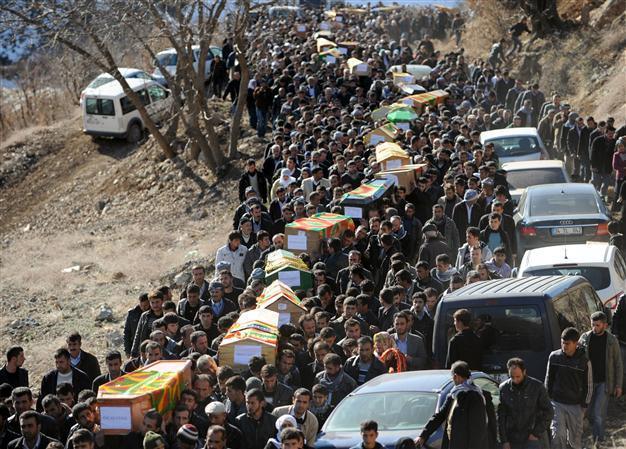HRW slams Uludere massacre impunity as 'proof that state can get away with killing civilians'
ANKARA

This picture taken on Dec. 30, 2011 shows Kurdish villagers carrying the coffins of victims of a the air raid in Uludere, Şırnak province. AFP photo
Human Rights Watch (HRW) has expressed outrage over the decision of Turkish military prosecutors to dismiss the investigation into the Uludere/Roboski massacre, slamming the “impunity” of those responsible for ordering and executing the air strike that killed 34 civilians on Turkey’s border with Iraq in December 2011.
“A 16-page decision by an Ankara military prosecutor [Dec. 7] proved once again that in Turkey the state can kill civilians and get away with it,” Emma Sinclair-Webb, the senior Turkey researcher at HRW, said in a statement on Jan. 7.
Sinclair-Webb also criticized the fact that a civil court in Diyarbakır had handed the probe over to military prosecutors after ruling for non-jurisdiction. “In June the prosecutor’s office in Diyarbakir washed its hands of the case and passed the file to the military prosecutor’s office in Ankara,” the statement read.
The General Staff’s Military Prosecutor’s Office had said on Dec. 7 that no law suit would be necessary, arguing that their ruling military officers had made an “inevitable mistake” while performing their duty.
The air strikes eventually carried out near the Turkish-Iraqi border in the village of Uludere in the Şırnak district on Dec. 28, 2011 cost the lives of 34 civilians from the Ortasu (Roboski in Kurdish) village. The victims were allegedly mistaken for outlawed Kurdistan Workers’ Party (PKK) militants, while they were smuggling goods into Turkey.
The military prosecutors ruling also detailed the decision-making process, revealing that all the top brass, including the Chief of General Staff, approved of the strikes.
Sinclair-Webb added that the families of the victims may go to the European Court of Human Rights if further appeals inside Turkey do not bear fruit.
